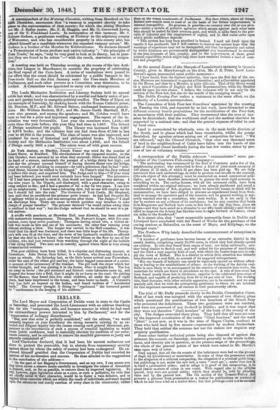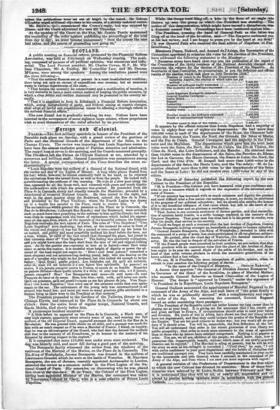IRELAND.
The Lord Mayor and Corporation of Dublin went in state to the Castle on Saturday, and presented the Lord-Lieutenant with an address thanking him for the " temperate, able, and humane manner in which he had used the extraordinary powers intrusted to him by Parliament," and for the 'suppression of unhappy disturbances." "Bat, now that order is perfectly established," said the address, "we would earnestly impress on your hxcellency the strong necessity existing for an ex- tended and diligent inquiry into the causes creating such general discontent, pre- paratory to the introduction of such a system of remedial legislation as would create public confidence, tend to materially alleviate the condition of our unfor- tunate country, and be calculated to remove the manifold grievances so justly and generally complained of." Lord Clarendon declared, that it had been his earnest endeavour not alone to protect the peaceable, but to abstain from unnecessary severity against those by whom the safety of society had been endangered. He ex- pressed himself gratified that the Corporation of Dublin had recorded its Opinion of his moderation and success. He thus alluded to the suggestions in the conclusion of the address-
" On the part of her Majesty's Government, and on my own, I can assure you that there exists a sincere desire carefully to investigate the causes of discontent in Ireland, and, as far as possible, to remove them by improved legislation. To rely, however, upon legislation alone as a cure, or even a palliation, for evils that are chiefly social in their character, would be to foster a vain delusion, and to neglect those remedies which are within the reach of individuals, and must depend upon the strenuous and manly exertion of every class in the community, rather
than on the wisest enactments of Parliament. But that which, above all things, Ireland now stands most in need of as the basis of her future improvement, is internal tranquillity. No progress is possible—no country ever did or can pros- per—under a system of political agitation which arrays against each other men who should be united for their common good, and which is alike fatal to the pur- suits of industry and the employment of capital, and to that social order upon which public confidence depends. " This system has long been practised in Ireland. I need not dwell upon the results it has produced; but I will venture to ex press my earnest hope that the warnings of experience may not be disregarded, and that the ingenuity and talent by which Irishmen are preeminently distinguished may henceforward be devoted to the true interests of this country, and to the improvement of those great natural capabilities which might long since have rendered Ireland a land of com- fort and prosperity."
At the annual dinner of the Marquis of Lansdowne's tenantry in queen's County, given in Maryborough on the 21st, Mr. J. R. Price, Lord Lans- downe's agent, announced some public measures- " I have heard, from the highest authority, that upon the first day of the ses- sion Ministers are determined to appoint a Committee; and a Committee appointed by the House, and that by a Member, is quite different. That of the House would be a mixed Committee of English and Irish Representatives, while the Member could fix upon his own choice. I believe the measures will be not only for the revision of the Poor-law, but also for the benefit of the occupying tenant."
The Dublin Evening Post makes a statement to the same effect, on the authority of a London correspondent.
The Committee of Irish Poor-law Guardians appointed by the meeting on Tuesday the 19th, and reported by us last week, have forwarded to the different country boards propositions for the modification of the Poor-law, in accordance with their petition. They recommend that the area of tax- ation be diminished; that the workhouse staff and the medical charities be supported by a national rate; and that the general expense of relief be met by local rates.
Land is surrendered by wholesale, even in the most fertile districts of the South, and in places which had been remarkable, whilst the potato flourished, for agrarian crimes arising out of competition for land. " We are informed," says the Clonmel Chronicle, " that over one thousand acres of land in the neighbourhood of Cahir have fallen into the hands of the Earl of Glengall (head landlord) during the last few weeks, either by pro- cess of law or voluntary eviction."
A correspondent of the Dublin Advocate " communicates" some par- ticulars of the Courtown Fish-curing Company— "'The undertaking was commenced by the Earl of Coartown and a few of the neighbouring gentry; who subscribed to form a kind of joint-stock company of 100 shares of 51. each, of which 31. per share has been paid up. We are fully convinced that such undertakings, in order to produce real benefit to the country, (the sole object of this attempt,) must be conducted on sound commercial prin- ciples; and we have therefore determined to pursue the most rigid economy in everything we do. The curing-houses, with all the necessary outfit, have been completed within our original estimate; we have already purchased and cured a considerable quantity of fish, at prices which we have fair reason to think will be remunerative; we have been obliged to procure an experienced hand from Scot-, land to manage the operative part of the concern; and its general working is nar- rowly watched over by a committee, who meet weekly. It is too early in the day to venture on any evidence of its usefulness; but we may mention that boats from Kingstown and Bullock have come to fish here, for the first time, since we began-and they have acted as a stimulus to our cittn boattsalreldy—and that an effort to improve the fishery has likewise been brought forward at Cahore, about six miles to the Southward."
It is stated also, that "most respectable mercantile firms in Dublin and Liverpool have concluded with the Board of Works for the purchase of the curing stations at Belmullet, on the coast of Mayo, and Killybegs, on the Donegal coast."
The Northern Whig lately described the commencement of enterprises in other fields—
"A number of gentlemen have become lessees of an extensive district in the county Antrim, comprising nearly 25,000 acres, in which they had already opened one colliery. In this they found three seams of coal; one being anthracite; ano- ther being similar to Scotch coal, and well suited for the purposes of machinery; and the third a very superior kind of coal, with which the lessees hope soon to sup- ply the town of Belfast. This is a district to which little attention has hitherto been directed as a coal-field, on account of its supposed unimportance. "But one branch of industry can rarely be vigorously carried on without affect- ing or leading to the establishment of others: so the working of the Antrim coal- fields is soon likely to be accompanied by the erection of extensive iron-works, the materials for which are found in abundance on the spot. A vein of iron-stone has been found nearly three feet in thickness, superior to the celebrated iron-stone of Scotland, and capable of producing from 60 to 64 per cent of iron. For working this, blast furnaces, with other suitable apparatus, are to be erected: and we need scarcely add, that we wish the enterprising gentlemen to whom we are indebted for this important movement, all success in their praiseworthy efforts.
The trial of Mr. Duffy proceeds slowly in the Dublin Commission Court. Most of last week was occupied with the argument of two dilatory pleas which questioned the qualifications of two members of the Grand Jury who presented the indictment. These two gentlemen were not resident, and were not possessed of any freehold in Dublin; and it was urged that they were not therefore "liberi homines" of the body of the county of the city. The Judges overruled these pleas. They held that all men are now by the improved constitution of the realm "liberi homines," and the word "liberi" is not now, as it was in the time of Magna Charts, confined to those who held land by free tenure—represented by modern freeholders. They held that neither the common law nor the statute law requires any property qualification. Some other farther technical points being also disposed of against the prisoner, his counsel, on Saturday, demurred generally to the whole indict- ment, and thereby put in question, at the present stage of the proceedings, the whole of the general points of law which were raised in Mr. Martin's case upon writ of error.
They argued, that all the six counts of the indictment were bad on the ground of dupli ity (doubleness) or uncertainty. In some of them the prosecutor added b the allegation of a criminal compassing, the allegation of a criminal publishiu4; but publishing is not, wider the new law, a mere "overt act"; under that law at is itself a substantive crime; and to allege it in proof of the compassing, is to plead double matters of crime in one count. With regard also to the articles quoted, they were not quoted entire; which they should be both by pleading rules and by the general law. The 7th section of the Treason-Felony Act protects a prisoner from prosecution as a traitor for publications. on account of which he bad been tried as a traitor-felon; but that privilege could not he secured
unless the publications were set out at length in the record. Sir Colman O'Loghlen urged additional objections to the counts, of a strictly technical nature. Mr. Baldwin, Q.C., commenced the Crown's reply, but was stopped by illness; and the Court adjourned the case till Thursday.
At the opening of the Court on the 21st, Mr. Justice Perrin announced the rescinding of' the order against publishing the proceedings of the trial from day to day; an order become unnecessary " from the course the case had taken, and the course of proceeding now going on."



























 Previous page
Previous page